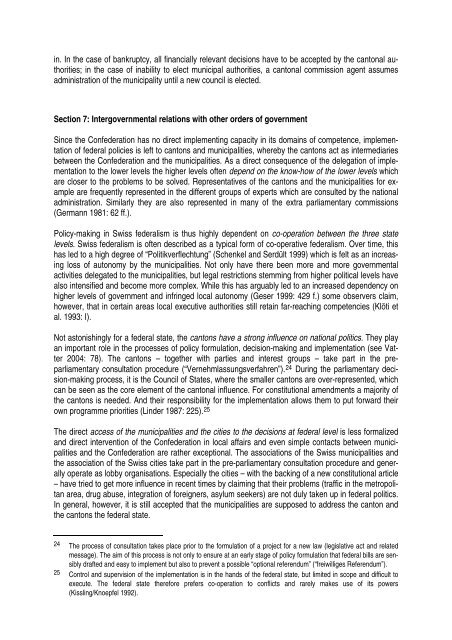Local Government and Metropolitan Regions in Switzerland - IDHEAP
Local Government and Metropolitan Regions in Switzerland - IDHEAP
Local Government and Metropolitan Regions in Switzerland - IDHEAP
You also want an ePaper? Increase the reach of your titles
YUMPU automatically turns print PDFs into web optimized ePapers that Google loves.
<strong>in</strong>. In the case of bankruptcy, all f<strong>in</strong>ancially relevant decisions have to be accepted by the cantonal authorities;<br />
<strong>in</strong> the case of <strong>in</strong>ability to elect municipal authorities, a cantonal commission agent assumes<br />
adm<strong>in</strong>istration of the municipality until a new council is elected.<br />
Section 7: Intergovernmental relations with other orders of government<br />
S<strong>in</strong>ce the Confederation has no direct implement<strong>in</strong>g capacity <strong>in</strong> its doma<strong>in</strong>s of competence, implementation<br />
of federal policies is left to cantons <strong>and</strong> municipalities, whereby the cantons act as <strong>in</strong>termediaries<br />
between the Confederation <strong>and</strong> the municipalities. As a direct consequence of the delegation of implementation<br />
to the lower levels the higher levels often depend on the know-how of the lower levels which<br />
are closer to the problems to be solved. Representatives of the cantons <strong>and</strong> the municipalities for example<br />
are frequently represented <strong>in</strong> the different groups of experts which are consulted by the national<br />
adm<strong>in</strong>istration. Similarly they are also represented <strong>in</strong> many of the extra parliamentary commissions<br />
(Germann 1981: 62 ff.).<br />
Policy-mak<strong>in</strong>g <strong>in</strong> Swiss federalism is thus highly dependent on co-operation between the three state<br />
levels. Swiss federalism is often described as a typical form of co-operative federalism. Over time, this<br />
has led to a high degree of “Politikverflechtung” (Schenkel <strong>and</strong> Serdült 1999) which is felt as an <strong>in</strong>creas<strong>in</strong>g<br />
loss of autonomy by the municipalities. Not only have there been more <strong>and</strong> more governmental<br />
activities delegated to the municipalities, but legal restrictions stemm<strong>in</strong>g from higher political levels have<br />
also <strong>in</strong>tensified <strong>and</strong> become more complex. While this has arguably led to an <strong>in</strong>creased dependency on<br />
higher levels of government <strong>and</strong> <strong>in</strong>fr<strong>in</strong>ged local autonomy (Geser 1999: 429 f.) some observers claim,<br />
however, that <strong>in</strong> certa<strong>in</strong> areas local executive authorities still reta<strong>in</strong> far-reach<strong>in</strong>g competencies (Klöti et<br />
al. 1993: I).<br />
Not astonish<strong>in</strong>gly for a federal state, the cantons have a strong <strong>in</strong>fluence on national politics. They play<br />
an important role <strong>in</strong> the processes of policy formulation, decision-mak<strong>in</strong>g <strong>and</strong> implementation (see Vatter<br />
2004: 78). The cantons – together with parties <strong>and</strong> <strong>in</strong>terest groups – take part <strong>in</strong> the preparliamentary<br />
consultation procedure (“Vernehmlassungsverfahren”). 24 Dur<strong>in</strong>g the parliamentary decision-mak<strong>in</strong>g<br />
process, it is the Council of States, where the smaller cantons are over-represented, which<br />
can be seen as the core element of the cantonal <strong>in</strong>fluence. For constitutional amendments a majority of<br />
the cantons is needed. And their responsibility for the implementation allows them to put forward their<br />
own programme priorities (L<strong>in</strong>der 1987: 225). 25<br />
The direct access of the municipalities <strong>and</strong> the cities to the decisions at federal level is less formalized<br />
<strong>and</strong> direct <strong>in</strong>tervention of the Confederation <strong>in</strong> local affairs <strong>and</strong> even simple contacts between municipalities<br />
<strong>and</strong> the Confederation are rather exceptional. The associations of the Swiss municipalities <strong>and</strong><br />
the association of the Swiss cities take part <strong>in</strong> the pre-parliamentary consultation procedure <strong>and</strong> generally<br />
operate as lobby organisations. Especially the cities – with the back<strong>in</strong>g of a new constitutional article<br />
– have tried to get more <strong>in</strong>fluence <strong>in</strong> recent times by claim<strong>in</strong>g that their problems (traffic <strong>in</strong> the metropolitan<br />
area, drug abuse, <strong>in</strong>tegration of foreigners, asylum seekers) are not duly taken up <strong>in</strong> federal politics.<br />
In general, however, it is still accepted that the municipalities are supposed to address the canton <strong>and</strong><br />
the cantons the federal state.<br />
24 The process of consultation takes place prior to the formulation of a project for a new law (legislative act <strong>and</strong> related<br />
message). The aim of this process is not only to ensure at an early stage of policy formulation that federal bills are sensibly<br />
drafted <strong>and</strong> easy to implement but also to prevent a possible “optional referendum” (“freiwilliges Referendum”).<br />
25 Control <strong>and</strong> supervision of the implementation is <strong>in</strong> the h<strong>and</strong>s of the federal state, but limited <strong>in</strong> scope <strong>and</strong> difficult to<br />
execute. The federal state therefore prefers co-operation to conflicts <strong>and</strong> rarely makes use of its powers<br />
(Kissl<strong>in</strong>g/Knoepfel 1992).<br />
15










